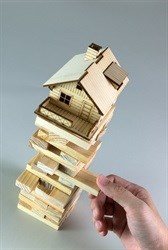
Top stories

Marketing & MediaWarner Bros. was “nice to have” but not at any price, says Netflix
Karabo Ledwaba 16 minutes


Energy & MiningSouth Africa's hydrogen horizon brightens with R100m Wits-Air Liquide initiative
21 minutes



More news
















The general election in May and the earlier interest rate hike failed to dampen enthusiasm for residential bricks and mortar, with estate agents operating across the market reporting sound trading. Internationally, South African house prices have done well in nominal terms, further highlighting the investment opportunities for this asset class.
A significant number of high net worth South Africans have fuelled the prime residential real estate market nationally, including along the KwaZulu-Natal north coast where record prices have been achieved in recent months.
Realistically, the investment appetite is driven by the knowledge that property prices will rise - and if owners are not bound to swift sales, they can rather hold on to their investments until the time and market reflects their desired return on investment.
However, the 2008 global recession demonstrated the extent to which property prices can dramatically collapse seemingly overnight with both the US and Spain still suffering the after-effects of financial decisions instrumental in that demise. Investors borrowing capital close to a market peak are most likely to lose on their value as the asset slumps and liabilities climb disproportionately.
Essentially, borrowing to buy property only works when investors are not purchasing at the top of the cycle. When house prices rise substantially, it only takes a small interest rate hike to push investors into defaulting - and when those buyers were marginal ones originally, that position becomes increasingly precarious.
Defaults lead to forced sales that escalate the rate at which prices tumble and typically banks, happy to lend when prices are rising and the market sound, tighten their credit-lending criteria.
This correspondingly makes it more difficult for investors to acquire bargains.
Comparing average house prices to average income levels is one measure of whether property prices are climbing beyond affordability. When the rise in house prices outstrips the rise in income levels, properties become unaffordable.
Initially people will sacrifice the smaller pleasures and lifestyle choices to get on to the property ladder, but the law of economics dictates they reach the point when property becomes out of their league; existing property stock, particularly when introduced by speculators unwilling to shift their price, does not sell and prices tumble.
The annual growth in bonds advanced is another measure of stability - and in South Africa this figure has stuck below 5% since September 2009.
Coming into the millennium, the country had pent-up demand. The high interest rates of the late 1990s had forced people to delay purchasing properties and at the same time, the country was exploding with a new black middle-class who ranked home ownership among their desires.
It was an era when prices achieved an unheard-of phenomenon - tripling in a decade - and realistically investors cannot anticipate this being repeated. While the market dipped in 2009 and experienced another to a lesser degree in 2012, the support of the growing black middle-class and escalating urbanisation has retained market equilibrium in the market.
That brings the issue full circle - property prices can fall and investors must apply the basic investment principles. They need a long-term view on their property holding; must focus on the valuation and not the recent returns, and diversify. Property should be part of a diversified investment portfolio, backed by the rationale that it is an attractive asset class.
